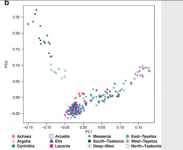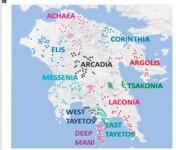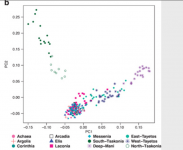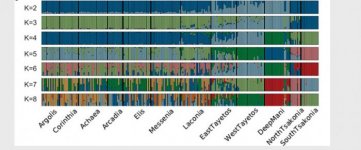to angela
i have two questions
1.i have noticed that even if the laconians share dna with both the maniots and the tsakonians that have the lowest shared ancestry with the italians.
And even if in the north of laconia there is arcadia that shares shares the 3rd lowest shared ancestry with the italians, laconia non the less haves a slight higher shared ancstry with the italians than every one else.
do you think that this is caused by the existance of some small hot spot (like sparta or malvasia for example) that haves even higher shared ancestry or is it just explained by the s.d
2.the difference of tsakonians and maniots from the rest of the peloponneseans is explained by a founder effect because of the isolation or because they are more pure?
i belive that both cases are true but mainly because of the founder effect
I don't think there are any "pure" ethnic groups. Every group is a mixture of prior groups. If you mean do I think that the Tsakonians and the Maniots (including the Tayetos) are more similar to the ancient Greeks than other groups, I don't know. We need ancient dna to figure that out. If that turns out to be the case then it would probably indeed be because of their isolation. Isolation lets certain populations remain more "pure" in that sense. A further complication is that those two groups are different from one another. If they were both just descendants of Classical Era Greeks, why the difference?
As to Lakonia, it covers a wide stretch of the Peloponnesus. The Lakonian samples from Paschou et al were labeled South East Lakonia, so maybe only from the isthmus in the southeast?
Click to enlarge.
View attachment 8570
On the PCA you can clearly see the separation of the Maniotes and the Tsakones from each other and from other Peloponnesians. The Lakonians are in between. A few of them are pretty close to some Tayetos samples, but the majority seem to cluster with the rest of the Peloponnesians. This may be just a north/south plus terrain difference. Are the Lakonian samples from the center north from a more accessible area?

In the body of the paper the authors say that it's the Maniots, including the ones from the Tayetos, who share the most ancestry with Sicilians and Italians. From the paper:
"
The Maniots differ from all other Peloponneseans by PCA (Figure 1b) and ADMIXTURE (Figure 1e) analysis. They also differ from mainland, island and Asia Minor Greek populations (data not shown) and from all the other populations of Supplementary Figure 4, which have been compared by PCA analysis, but they partially overlap with the Sicilians and the Italians.
So, I don't see how it can be the Lakonians minus the Maniots who are the most similar, if that's what you mean.
Table 2 seems to be based on the Admixture run, and they have divided the Peloponnesus up into the major areas, so I think Laconia here might mean all of Laconia, including Tayetos, Mani, Tsakonia etc. They have the highest similarity, 96% and Arcadia the lowest, at 85%. Of course it would have been much better had they explained the samples better for this and all their other tables and charts. I'm assuming also, that going by the Admixture run upon which they say this is based, "Italians" includes Italians and Sicilians.
Click to enlarge.

As I said, the authors really left a lot of ambiguity because of poor labeling. Perhaps they should be contacted for clarification about which specific samples are included in specific graphs and charts.









